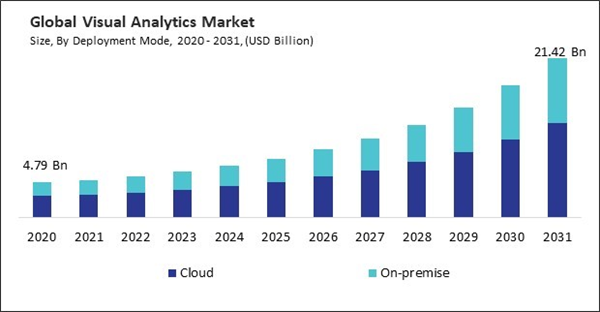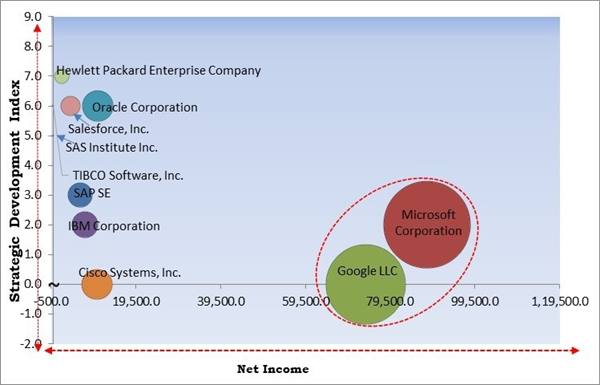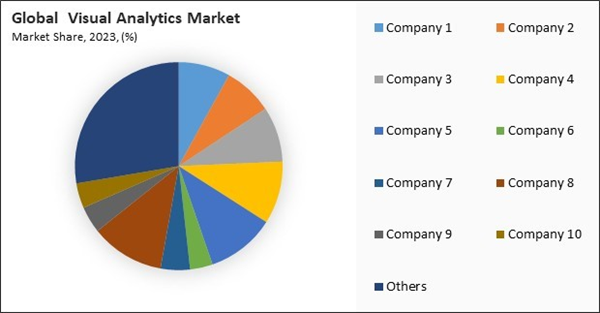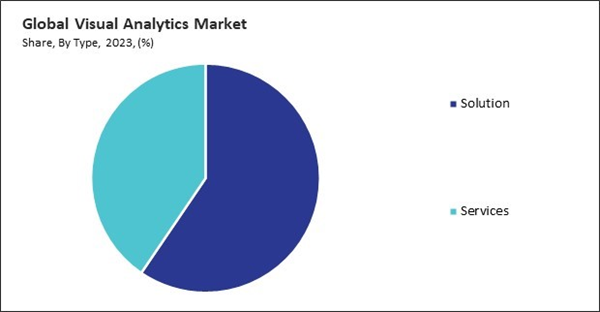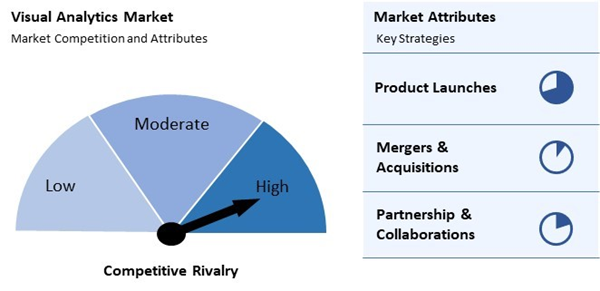Telecom and IT companies utilize visual analytics to monitor network performance, optimize service delivery, and analyze customer data to enhance user experiences. Thus, in 2023, the telecom & IT segment procured 8% revenue share in the market. The increasing complexity of IT operations and the rising demand for efficient network management have fueled the adoption of visual analytics in this segment. Additionally, integrating AI and machine learning into visual analytics tools has empowered telecom and IT organizations to derive actionable insights from massive datasets.
The major strategies followed by the market participants are Product Launches as the key developmental strategy to keep pace with the changing demands of end users. For instance, In September, 2024, Salesforce, Inc. launched Tableau Einstein, an AI-powered visual analytics platform designed for scalable, data-driven decision-making. It integrates with Salesforce and third-party apps, enabling users to access insights in their workflow. Featuring autonomous agents, customizable dashboards, and a marketplace for sharing assets. Additionally, In June, 2024, TIBCO Software, Inc. unveiled EBX 6.2 enhances enterprise Data Management with features like automatic metadata harvesting, a next-gen customizable UI, improved data visualization, embedded scripting, streamlined APIs, and advanced permissions. Updates include better matching/merging, digital asset management, and staging improvements, enabling seamless governance, integration, and accessibility of critical business data.
Cardinal Matrix - Market Competition Analysis
Based on the Analysis presented in the Cardinal matrix; Microsoft Corporation and Google LLC are the forerunners in the Visual Analytics Market. Companies such as Oracle Corporation, Cisco Systems, Inc., and IBM Corporation are some of the key innovators in Visual Analytics Market. In October, 2024, Oracle Corporation launched Oracle Analytics Intelligence for Life Sciences, an AI-driven platform that unifies data to accelerate insights, optimize therapeutic launches, and bridge clinical research and care. Powered by Oracle Cloud Infrastructure and Health Data Intelligence, it integrates diverse datasets, supports multidisciplinary research, and enhances decision-making with pre-built analytics and real-world data.Market Growth Factors
Technological innovations have reduced the cost and complexity of implementing these visualization tools. Open-source platforms and cloud-based solutions have made advanced visualization capabilities more affordable and scalable. This democratization of technology means that smaller businesses and startups can now take advantage of visual analytics without incurring prohibitive costs. Therefore, as the availability and accessibility of these tools continue to grow, organizations of all sizes are more likely to adopt visual analytics solutions.With increasing pressure to deliver value while controlling expenses, businesses are turning to visual analytics to improve operational efficiency and support long-term cost-saving strategies. As more organizations become aware of the tangible benefits of using data visualization tools to optimize operations, the demand for such solutions will continue to grow. The cost benefits of visual analytics, particularly in terms of reducing wasted resources and improving overall productivity, make them an attractive investment for businesses striving to remain competitive in an increasingly cost-conscious environment. Hence, increasing focus on operational efficiency and cost optimization propels the market's growth.
Market Restraining Factors
The high cost of implementation is not necessarily a permanent constraint. As the market for visual analytics continues to grow, the cost of these tools is expected to decrease over time, particularly as new technologies and platforms make them more accessible. Additionally, the increasing availability of subscription-based or pay-as-you-go models allows organizations to spread the costs over time, reducing the financial burden associated with initial investments. Therefore, high implementation costs and initial investment hamper the market's growth.The leading players in the market are competing with diverse innovative offerings to remain competitive in the market. The above illustration shows the percentage of revenue shared by some of the leading companies in the market. The leading players of the market are adopting various strategies in order to cater demand coming from the different industries. The key developmental strategies in the market are Product Launches and Product Expansions.
Driving and Restraining Factors
Drivers- Proliferation of Advanced Visualization Technologies
- Increasing Focus on Operational Efficiency and Cost Optimization
- Rapid Digital Transformation Across Sectors Worldwide
- High Implementation Costs and Initial Investment
- Data Privacy and Security Concerns
- Rising Penetration of the Internet of Things (IoT)
- Growing Demand for Enhanced Customer Experiences
- Issues with Real-Time Data Processing and Latency
- Difficulty in Selecting the Right Analytics Tools for Specific Needs
Type Outlook
Based on type, the market is divided into solution and services. In 2023, the services segment held 40% revenue share in the market. This segment includes professional services, such as consulting, implementation, and training, as well as managed services that ensure the continuous performance and optimization of visual analytics systems. Organizations rely on these services to customize visual analytics solutions according to their unique needs and to ensure seamless integration with existing systems. The growing complexity of data and the need for expert support to manage visual analytics platforms have driven the demand for services, positioning this segment as a significant contributor to the overall market.Services Outlook
The services segment is further subdivided into professional services and managed services. In 2023, the professional services segment registered 63% revenue share in the market. Professional services encompass consulting, system implementation, integration, and training services, which help organizations adopt and optimize visual analytics solutions. Businesses increasingly rely on these services to tailor visual analytics platforms to their needs, ensuring the tools align with organizational objectives and workflows. The demand for professional services is particularly strong among enterprises implementing visual analytics for the first time or expanding their existing systems.Business Function Outlook
On the basis of business function, the market is segmented into sales & marketing, finance & IT, supply chain management, human resources, and others. The sales & marketing segment recorded 32% revenue share in the market in 2023. This is primarily due to the growing reliance on visual analytics tools to understand consumer behavior, optimize marketing campaigns, and improve sales strategies. Businesses leverage these tools to analyze customer data, track campaign performance, and forecast sales trends in real-time, enabling data-driven decision-making.Organization Size Outlook
Based on organization size, the market is categorized into small & medium enterprises and large enterprises. The small & medium enterprises segment witnessed 37% revenue share in the market in 2023. SMEs increasingly recognize the value of visual analytics in improving operational efficiency, understanding customer behavior, and staying competitive in dynamic markets. The availability of cost-effective and cloud-based analytics solutions has made these tools more accessible to smaller organizations. By leveraging visual analytics, SMEs can uncover insights from limited datasets, enabling them to make data-driven decisions and drive growth.Deployment Mode Outlook
By deployment mode, the market is divided into cloud and on-premise. In 2023, the cloud segment registered 61% revenue share in the market. Cloud-based visual analytics solutions have gained widespread adoption due to their scalability, flexibility, and cost-effectiveness. Businesses increasingly prefer cloud deployments, which allow seamless access to data and analytics tools from anywhere and support remote work and collaborative environments.Vertical Outlook
Based on vertical, the market is divided into BFSI, government, energy & utilities, healthcare, manufacturing, retail, telecom & IT, and others. The BFSI segment attained 23% revenue share in the market in 2023. This dominance is driven by the increasing need for financial institutions to manage and analyze large volumes of data for fraud detection, risk management, and customer insights. Visual analytics tools enable banks and financial service providers to create real-time dashboards, monitor transactions, and enhance customer experiences through personalized services. The growing adoption of digital banking and fintech solutions has amplified the demand for visual analytics in the BFSI sector.Market Competition and Attributes
The Visual Analytics Market is highly competitive, fueled by growing demand for intuitive data visualization tools that enable real-time insights and data-driven decision-making. Providers focus on integrating AI, machine learning, and predictive analytics to enhance functionality. The market's growth is driven by digital transformation, big data adoption, and the need for user-friendly platforms across industries. Intense competition encourages continuous innovation, with companies prioritizing scalability, customization, and seamless integration with existing enterprise systems to address diverse analytical needs.
By Regional Analysis
Region-wise, the market is analyzed across North America, Europe, Asia Pacific, and LAMEA. The North America region witnessed 38% revenue share in the market in 2023. This dominance can be attributed to the early adoption of advanced analytics technologies, a robust IT infrastructure, and the presence of key market players in the region. Industries such as BFSI, healthcare, and retail in North America have widely embraced visual analytics to improve decision-making and operational efficiency.Recent Strategies Deployed in the Market
- Nov-2024: IBM Corporation partnered with Scuderia Ferrari HP to make IBM the official Fan Engagement and Data Analytics Partner of Formula 1’s iconic team. Leveraging IBM’s advanced analytics and digital expertise, this collaboration aims to revolutionize fan experiences and enhance data-driven insights for Ferrari’s prestigious motorsport brand.
- Aug-2024: Microsoft Corporation partnered with Palantir Technologies to deliver secure AI and cloud solutions for U.S. Defense and Intelligence. Integrating Palantir’s AI Platforms with Microsoft’s Azure OpenAI Service in classified environments will enable safe, AI-driven operations, enhancing mission-critical capabilities across defense, logistics, and intelligence sectors with ethical AI practices.
- Mar-2024: SAP SE unveiled the SAP Analytics Cloud app, which enhances business data exploration with optimized viewing, interactive tools like filters and drill-downs, and customizable drag-and-drop boards. Requiring a SAC subscription with mobile services enabled, it revolutionizes data storytelling with convenience, utility, and innovative efficiency.
- Jan-2023: Oracle Corporation unveiled Fusion Analytics, a cloud-native solution for Fusion Cloud Applications (ERP, HCM, SCM, CX), which delivers prebuilt insights to enhance decision-making and align KPIs across business functions. The roadmap emphasizes advanced analytics, including configurable account analysis, Accounting Hub integration, EPM data connectors, and project analytics for financial and operational insights.
- Apr-2022: Salesforce, Inc. introduced CRM Analytics with AI-powered insights to enhance customer relationships across industries. Innovations like the CRM Analytics App for Slack, Predictions in Slack, Search Insights, and specialized analytics for Energy, Utilities, and Public Sector sectors enable data-driven decision-making and personalized experiences in workflows.
List of Key Companies Profiled
- IBM Corporation
- Oracle Corporation
- SAP SE
- Microsoft Corporation
- SAS Institute Inc.
- Cisco Systems, Inc.
- TIBCO Software, Inc. (Vista Equity Partners Management, LLC)
- Salesforce, Inc.
- Google LLC (Alphabet Inc.)
- Hewlett Packard Enterprise Company
Market Report Segmentation
By Deployment Mode- Cloud
- On-premise
- Solution
- Services
- Professional Services
- Managed Services
- Sales & Marketing
- Finance & IT
- Supply Chain Management
- Human Resource
- Other Business Function
- Large Enterprises
- Small & Medium Enterprises
- BFSI
- Government
- Energy & Utilities
- Healthcare
- Manufacturing
- Retail
- Telecom & IT
- Other Vertical
- North America
- US
- Canada
- Mexico
- Rest of North America
- Europe
- Germany
- UK
- France
- Russia
- Spain
- Italy
- Rest of Europe
- Asia Pacific
- China
- Japan
- India
- South Korea
- Australia
- Malaysia
- Rest of Asia Pacific
- LAMEA
- Brazil
- Argentina
- UAE
- Saudi Arabia
- South Africa
- Nigeria
- Rest of LAMEA
Table of Contents
Companies Mentioned
- IBM Corporation
- Oracle Corporation
- SAP SE
- Microsoft Corporation
- SAS Institute Inc.
- Cisco Systems, Inc.
- TIBCO Software, Inc. (Vista Equity Partners Management, LLC)
- Salesforce, Inc.
- Google LLC (Alphabet Inc.)
- Hewlett Packard Enterprise Company



